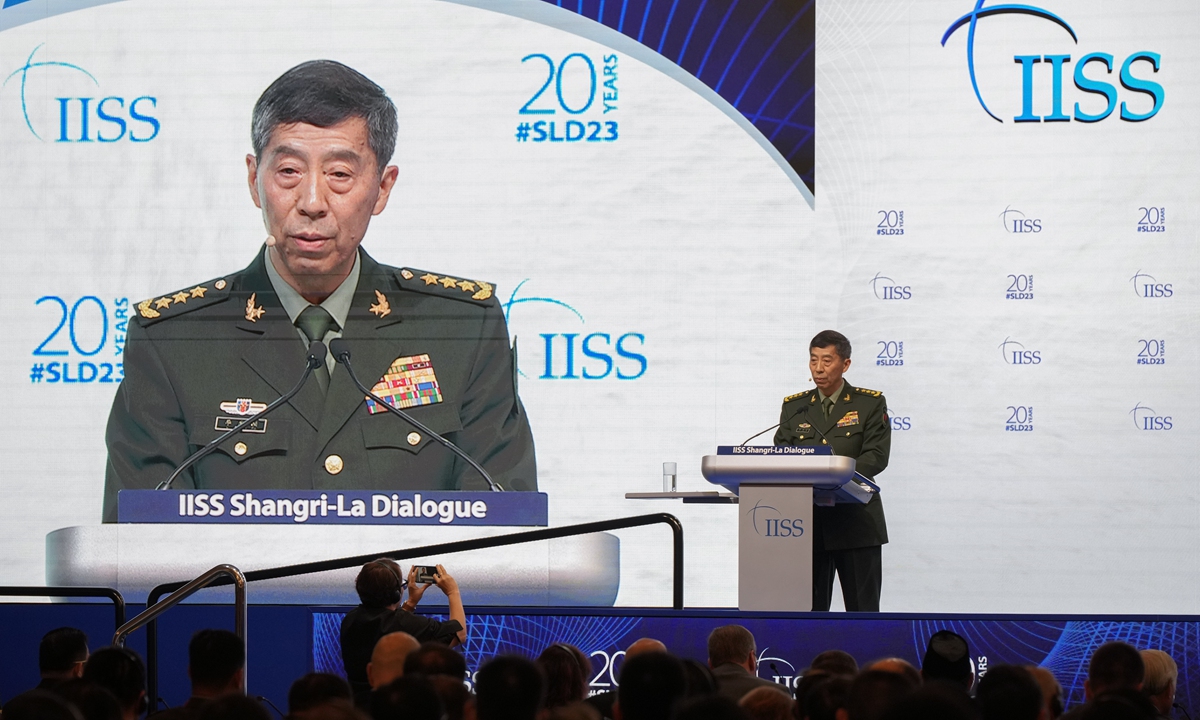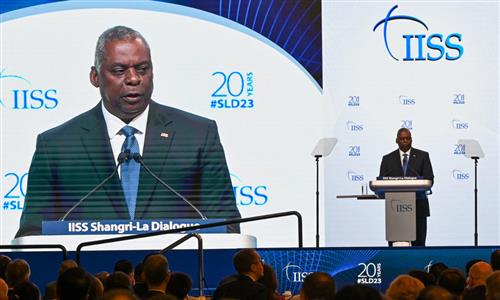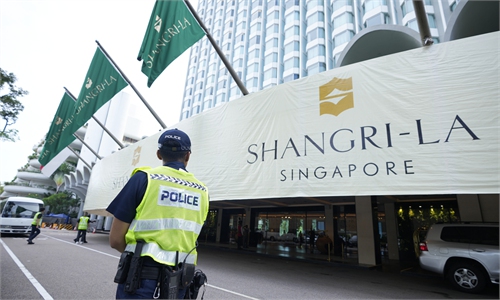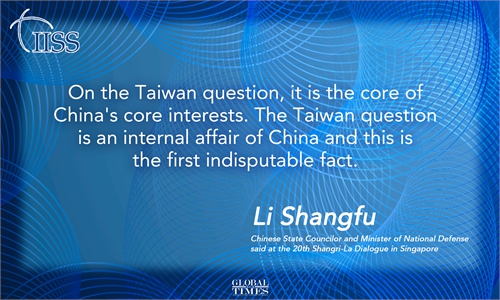China presents path to true, sustainable security for Asia-Pacific in contrast to US’ bloc confrontation approach at Shangri-La Dialogue

Chinese State Councilor and Minister of National Defense Li Shangfu delivers a keynote speech at the Shangri-La Dialogue in Singapore on June 4, 2023. Photo: VCG
Fierce "crossfire" between China and the US over security issues continues at the 20th IISS Shangri-La Dialogue in Singapore, as Chinese State Councilor and Minister of National Defense Li Shangfu elaborated on Sunday China's common, comprehensive, cooperative and sustainable security vision and its pursuit of a new path to security featuring dialogue over confrontation, partnership over alliance and win-win over zero-sum.
Delegates attending the event, through Li's remarks, can have a deeper understanding of the China-proposed Global Security Initiative (GSI), analysts said, as it conforms to the general trend of world peace and development and demonstrates China's wisdom, strength and efforts for regional security and prosperity, a stark contrast to US' divisive and bloc confrontation approach reflected in the speech by Secretary of Defense Lloyd Austin "US' leadership in the Indo-Pacific."
For true security
In a speech titled "China's New Security Initiatives," the Chinese defense minister said to implement the GSI, mutual respect should prevail over bullying and hegemony, fairness and justice should transcend the law of the jungle, eliminating conflicts and confrontation through mutual trust and consultation and preventing bloc confrontation with openness and inclusiveness.
"China stands ready to work with all parties to enhance our commitment to an Asia-Pacific community with a shared future, promote sound development of regional security cooperation and strive to build an open, inclusive, transparent and equitable architecture and pursue brighter prospects for security in the Asia-Pacific," Li said, specifying the needs to build stronger security and confidence-building systems; promote more equitable security rules; improve multilateral security mechanisms; and carry out more effective defense and security cooperation.
Li also underlined Chinese modernization as a powerful force driving development for all, contributes to safeguarding world peace and improving global governance.
On the Taiwan question, Li said China will strive for the prospects of peaceful reunification with utmost sincerity and greatest efforts but makes no promise to renounce the use of force. "If anyone dares to separate Taiwan from China, Chinese military will not hesitate for a second."
Li's speech received warm and long applause and his responses to 10 questions including on the South China Sea, Taiwan question, China-US relations, and Ukraine crisis conveyed Chinese stance in a clear manner. "China's new security initiatives" became a buzzword at the event, the Global Times learned on site.
During the 2023 dialogue, the first Li attends as Chinese defense minister, Li met with defense chiefs and delegations of countries including Mongolia, New Zealand, the Philippines, Cambodia, Malaysia, Germany, the UK, Australia, Japan, South Korea, Indonesia and international organizations, including the EU.
Dino Patti Djalal, former Indonesian vice-minister for foreign affairs, said the speech was very useful to know how China views military planning, geopolitical relationships with the region and the rest of the world, China-US relations, its views on international order, on the Taiwan question and South China Sea. "I'm sure Indonesia will stand ready to work with China in terms of security of the region," Djalal said at the event.
A thundershower on Sunday noon did not dampen media's passion to learn more about China's overall security vision and views on hot button issues as the Global Times saw reporters, some with wet shirts, surrounded all seven People's Liberation Army (PLA) representatives at an afternoon press conference in Shangri-La Hotel.
Li's reference of "certain countries" and "external forces" hints on the US without saying it, which is a gentle expression easier for audience to receive, Ei Sun Oh, principal advisor of the Pacific Research Center in Malaysia, noticed the detail.
Some research fellows from London-based International Institute for Strategic Studies (IISS) thought Li's speech have displayed professionalism, firm stance and adherence to principles, as well as sincerity, genuine willingness to communicate with others, particularly the US, according to Senior Colonel Zhu Qichao, Deputy Director of the Center for National Defense Technology and Strategic Studies of National University of Defense Technology.
Lieutenant General He Lei, former vice president of the Academy of Military Sciences of the PLA, told the Global Times that the GSI upholds the vision of common, comprehensive, cooperative and sustainable security, and conforms to the trend of world peace and development.
It provides a Chinese solution to the construction of an open, inclusive, transparent, and equal security architecture in the Asia-Pacific and contributes Chinese wisdom and strength to the cause, said He, who is also the former vice president of the Academy of Military Sciences of the PLA.
Global troublemaker
China and the US already traded barbs at the Shangri-La Dialogue summit over the Taiwan question and bilateral military relations in the past few days. The US did not rein in its "says one thing and does another" pattern, as it called on crisis management inside the summit venue while stepping up provocations outside.
The US Navy Arleigh Burke-class guided missile destroyer USS Chung-Hoon and the Canadian Navy Halifax-class frigate HMCS Montréal made a transit through the Taiwan Straits on Saturday. The PLA Eastern Theater Command handled the situation in accordance with law and regulations yet the two countries attacked China's response, calling it "aggressive."
The incident resembles a recent similar "thief crying 'stop thief'" scenario - a PLA Air Force J-16 fighter jet intercepted a US RC-135 reconnaissance plane when the latter attempted to spy on the PLA Navy Shandong aircraft carrier group's routine training in the South China Sea on May 26.
Who is disrupting peace in the Asia-Pacific? What are the root causes of chaos and instability? And what should we stay vigilant and guard against? Defense Minister Li raised the three questions in his Sunday speech.
In addition to actions, analysts said China's security initiative presents a stark contrast with and constitutes a loud response to US' divisive and bloc confrontation approach reflected in Lloyd Austin's speech, "US leadership in the Indo-Pacific."
Isn't it self-contradictory for the US to claim support ASEAN centrality on one hand while establishing blocs without ASEAN like Quad and AUKUS on the other? Zhang Chi, an associate professor at the National Defense University of PLA, asked Austin.
But Austin did not get the gist of the question, as he went on repeating AUKUS "absolutely promotes regional stability and security" without elaborating how.
John Pang, a former Malaysian government official and a senior research fellow at Perak Academy, Malaysia, tweeted, "It turns out Secretary Austin failed to address the question because he doesn't understand the term 'ASEAN centrality,' a core priority of ASEAN."
Senior Colonel Qi Dapeng, a delegate and director of National Security College at the National Defense University of PLA, told the Global Times on site that most Asia-Pacific countries do not agree with the US' practice of engaging in alliance politics and forming cliques.
Counterparts from Malaysia and New Zealand believe that there are nearly 200 countries and regions in the world, yet the US' enhancing communication and mutual trust is communicating within a small clique, rather than with the majority of the world, Qi said.
Pang said the propagation of NATO-like military structures in Asia-Pacific is based on a divisive and expansionist notion of security. This notion of security justifies yet more militarization, fulfilling a vicious cycle creating a pipeline of war for the military industrial complex.




